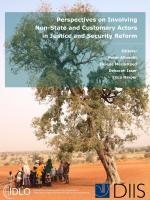Non-State Actors in Justice and Security Reform
Focusing on the role of non-state and customary actors in security and justice reform, this e-book engages with one of the most central debates in current international development intervention in fragile states. Its does so by questioning the key pillar of such interventions: state-building. Written by both practitioners and academics, the contributions suggest that international development programming should focus on "what works" and what is seen as legitimate justice and security by ordinary citizens, rather than on "what ought to be", based on Western normative frameworks. This means engaging with the variety of justice and security actors that already exist and are used by local citizens, rather than trying to build something entirely new. In the majority of contexts this implies a move away from the dominant state-centric approach, which focuses on building formal state institutions or on 'fixing' those that have failed.
The crux of the matter is that non-state actors, such as customary leaders, are the primary providers of justice and security in the Global South. They deal with an estimated 80 to 90 percent of disputes. This is an empirical reality that needs to be taken serious: even if state institutions did work as intended, they would unlikely fulfill the same justice needs as their non-state counterparts. A more pluralistic framework, which is both context-sensitive and evidence-based, is therefore a welcomed alternative to mainstream state-building.
Another key argument of the book is the need to bring politics into the center of program design and implementation. Not only are justice and security provision inherently political arenas
where power, resources and rights are at stake, international agencies' engagement with them also have significant political implications.
The book includes a general Introduction written by DIIS researchers Peter Albrecht and Helene Maria Kyed, who provide an overview of how non-state actors have been integrated into development programs over the past 5-10 years, and give a number of recommendations for improving such engagements. These are based on insights from the 9 chapters of the book, which explore concrete programme experiences and/or suggest alternative approaches based on in-depth analysis of the justice and security landscapes in specific contexts. Six different countries are covered in the book: Afghanistan, Indonesia, Ghana, Nepal, Marshall Islands, and Pakistan. One chapter focuses specifically on women’s access to justice in fragile state contexts.
The book is based on selected papers presented at the 1-3 November, 2010 Conference in Copenhagen: Access to Justice and Security. Non-State Actors and Local Dynamics of Ordering. The conference was organised by the Danish Institute for International Studies (DIIS) with support from the Danish Ministry of Foreign Affairs and with additional funding from the International Development Law Organisation (IDLO).
DIIS Experts



